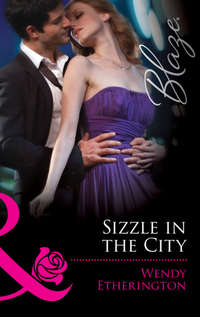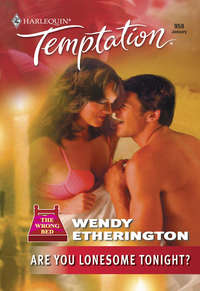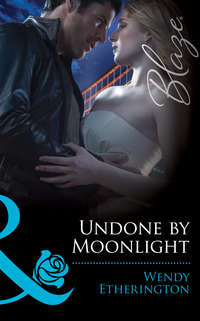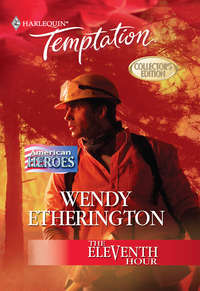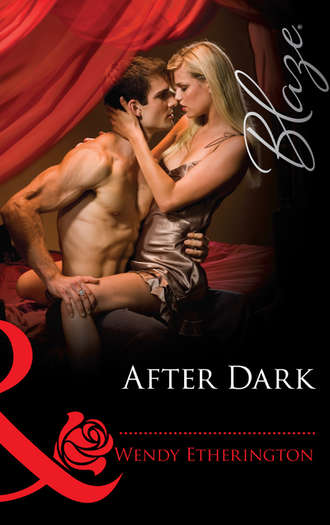
Полная версия
After Dark

He was standing behind her.
All six-feet-three-amazing-inches of him.
Sloan drew a quick breath as Aidan turned her to face him. She lifted her chin and his lips captured hers, silencing her in a flash. Her heart leaped in her chest, and she was pretty sure she let out a moan of longing.
He didn’t hesitate to tangle his tongue with hers. He tasted of the lemon he drank with his tea. He smelled of sawdust and spicy sandalwood.
She clutched his T-shirt in her fist, grasping to get closer. She wanted to feel his bare, sleek skin against hers, to have that intense gaze focused on her, to feel his muscles harden beneath her…to have him tremble and gasp along with her.
His hands molded her to his body and she felt the need, the hunger and the wild lust they’d been trying to deny. It had been too long, and she wasn’t going to miss her chance now that it had come, to satisfy her desires…and his.

Dear Reader,
I’m a Southerner with roots so deep my mother has directly traced me (since I’m the oldest grandchild) back seven generations to my great-several-times-over grandfather, who was one of the first non-Native Americans to live in Reeseville, Alabama.
Along with family histories, telling stories is a Southern tradition, and now that I live in South Carolina, I’m learning new tales to share. Palmer’s Island is my fictional combination of two real islands off the coast near Charleston—Isle of Palms and Sullivan’s Island. Beautiful and quiet, they represent a beloved living history in this part of the country.
Like any real Southern town, I infused my island with nosy but caring citizens, church ladies who love to bake casseroles and a beauty salon as gossip central. It was also the perfect place for my grieving hero, Aidan Kendrick, to hide and brood in a dark, damaged house behind a wall of tangled foliage. Fortunately for him, however, Sloan Caldwell and her fellow islanders are like the island itself—abundant with sunshine and forgiving of mistakes.
I hope you enjoy my tale of love and redemption—with an old-fashioned mystery mixed in to keep everybody guessing.
Best wishes,
Wendy Etherington
After Dark
Wendy Etherington

www.millsandboon.co.uk
ABOUT THE AUTHOR
Wendy Etherington was born and raised in the deep South—and she has the fried-chicken recipes and NASCAR ticket stubs to prove it. The author of nearly twenty books, she writes full-time from her home in South Carolina, where she lives with her husband and two daughters. She can be reached via www.wendyetherington.com or by regular mail at P.O. Box 3016, Irmo, SC 29063.
To my cousin, Mark Durham, a true Southerner
who knows how to tell a good story
Contents
Chapter 1
Chapter 2
Chapter 3
Chapter 4
Chapter 5
Chapter 6
Chapter 7
Chapter 8
Chapter 9
Chapter 10
Chapter 11
Chapter 12
Chapter 13
Epilogue
1
SLOAN CALDWELL yanked at the hem of her little black dress, then lifted the worn brass knocker on the big oak door. The resulting tapping noise sounded like a series of gunshots, echoing in the misty, dark night.
Every small town in the South had a crumbling, spooky old mansion on a hill, and hers didn’t disappoint—though their hill was more of a dune. To think, they now had a genuinely dark, eccentric and notorious owner to go with it.
It was spine-tingling stuff for Palmer’s Island, South Carolina.
As a barrier island just over three miles wide, with five restaurants, one bar, no high-rise hotels, one public park that was beach-accessible and its largest house—the one she was standing on the porch of—not backing up to the beach, the island itself was considered a bit eccentric. But the residents who lived there and the tourists who visited liked it that way.
After several long minutes, the door was flung open. The tall, dim shadow of a broad-shouldered man filled the frame. “What do you—” He stopped, cocking his head. “Who are you?”
Sloan really wished she could see his face, specifically his eyes—though she knew from the TV, newspaper and Internet how gorgeous he was—but the lack of light on the porch or in the foyer left most of the details about him to her memory and imagination.
She swallowed and held out her hand. “I’m Sloan Caldwell, Director of the Palmer’s Island Historical Preservation Society.”
“You’re a society matron?” he asked, his disbelieving tone clear.
Like blue hair was a requirement for social awareness. “Miss, actually.” She tried a smile and put her hand on her hip. She had nice hips. Men usually noticed. “May I come in?”
He crossed his arms over his chest and leaned against the door frame. “No.”
“No?”
“I’m busy at the moment. Come back another time.” He started to turn away.
She reached into the briefcase hitched on her shoulder and pulled out a file folder, which she handed him. “But you contacted me. About the renovations to the house?” she added when he remained silent.
Sighing audibly, he reached behind him and flipped a switch, which turned out to belong to a small desk lamp sitting on a sawhorse in the foyer. “My lawyer sent this,” he said, staring at the papers in the file, then flicking his gaze to hers. “I didn’t contact you.”
Silver. His eyes were a cool and piercing silver.
Again, she’d known this both from his recent notoriety courtesy of twenty-four-hour cable news and from the research she’d done on him. But the pImages** hadn’t done him justice. The pictures weren’t full of annoyance and sensual power. Nor had she been prepared for the breath-stealing impact of having that gaze focused on her. Not to mention the fact that those eyes were surrounded by a lean face, the sculpted jaw shadowed by dark stubble and tons of tousled, wavy black hair.
She shivered. And not in a bad way.
Clearing her throat, she tried to remember she was there on business. “As your lawyer is no doubt aware—even if you aren’t—all renovations to Batherton House must be approved by the committee before any work can be done.”
“So?”
“Your neighbors heard hammering.”
“What neighbors? The property encompasses three acres.”
“But past the intimidating, spooky and overgrown bushes and trees, there are houses on either side of you. You just can’t see them.” She smiled in the face of his frustration. “Sound tends to echo out here on the island.” She accepted the documents he thrust back into her hand. “I thought I should come out here personally and take a look at your plans.”
She could practically see the wheels in his brain spinning, striving desperately to find a way to get rid of her. She found his efforts surprising and interesting. Very few men had the urge to slam the door in her face.
And not just because she was the sheriff’s only daughter.
“Do you always come to business meetings at nearly nine at night, dressed like that?” he asked, drawing his eyebrows together.
“I preserve the past, Mr. Kendrick,” she said huskily, stepping closer, so that their bodies nearly touched. “But I live very much in the present.”
His eyes shone with interest for a split second, then he stepped back.
She walked past him, the faint scent of whiskey brushing by her nose. Drinking alone in a dark old house? Aidan Kendrick certainly lived up to his eccentric reputation.
“I bet you were surprised by the working electrical system,” she said, walking across the foyer’s wood floors and into the parlor, where she flipped on the switch for the bare bulb hanging from the ceiling. “Old Doc Marcus replaced it about twenty years ago.”
“Nothing surprises me, Miss Caldwell.” He paused. “At least not until you appeared on my porch.”
Smiling, she glanced over her shoulder at him. “I have that effect on some men.”
He nearly succeeding in looking amused. “I’ll bet.”
She wandered around the room, noting the stacks of boxes in one corner, the collection of hand and power tools gathered in another. Wondering about the lack of furniture, she strolled past him. She peeked into the dining room on the opposite side of the foyer, but finding nothing but a creaking and broken chandelier and an impressive collection of cobwebs, she moved into the central hallway and headed toward the back of the house, where she knew the kitchen was located.
Here, at least, there was a battered oak table and a set of chairs that looked reasonably sturdy. There was also evidence that someone actually lived in the house.
A brand-new stainless-steel refrigerator took up one corner. Empty water bottles were strewn across the scarred, yellowing, linoleum countertops. A partial loaf of bread sat next to a plate bearing a half-eaten ham sandwich. A nearly empty bottle of whiskey rested beside a stack of red plastic cups.
The whole place was depressing. It was hard to believe the Atlantic Ocean ebbed and flowed only a few blocks away.
She lowered herself into one of the chairs, set her briefcase beside her, then looked up at him. “It was rude of you not to invite me in. I thought you were from Atlanta.”
He frowned. “I am.”
“They never taught you Southern hospitality up there?”
“We’re a rare breed, I guess,” he said, his sarcasm clear. “For instance, we rarely come uninvited to someone’s house, then walk around like we own the place.”
She shrugged. “I came to see the house. I didn’t see any point in not getting started. Do you ever offer uninvited guests something to drink?”
He crossed his arms over his chest. “I have whiskey and water.”
She needed water for her dry mouth. Heavens, the man was so tempting. But she knew he’d smirk at that request. “I’ll have whiskey.”
“One finger or two?”
“One.”
Without comment, he moved to the counter, then poured a splash of the amber liquid into a fresh plastic cup. When he returned to her, he held out the cup.
She didn’t quite suppress a wince. “No ice?”
“I haven’t hooked up the ice maker yet.”
She took the cup, glanced into it, then tossed back the contents in one swallow. Her throat burned, then her chest. But she didn’t cough or flinch.
On occasion, she liked the rich, smoky taste of whiskey. However, she preferred it with a serious game of poker. Or a hot fire and a warm guy. Or, even better, a hot guy and a blazing fire.
“Do I pass?” she asked, handing him back the cup.
“Pass what?”
“The test on not being afraid of you.”
“I’m not testing you,” he said, his annoyance intensifying. “I’m not doing anything with you.”
But you could be. She’d never gone after a guy who clearly wanted to see the back of her. In fact, she’d had enough of guys she wanted, but who’d suddenly realized they didn’t want her.
Guy, really.
After wallowing in Rejected Land a few months back, she’d decided she liked her guys fun, enthralled and uncomplicated. Which Davis had been. Before he’d decided to run off to Atlanta after some other woman—and a job with the man glaring at her now.
Which brought up a whole new complication. Why had Aidan Kendrick decided to come to Palmer’s Island? Did it have anything to do with Davis? How well did the two men know each other?
When her life decided to come full circle, it had apparently chosen to jump on the upside-down roller coaster, rather than the merry-go-round.
“Oh, so you’re not trying to intimidate me into running back to town and leaving you to your brooding and hammering?”
“Sure I am.” His lips curved. “And, yes, you would greatly aid my efforts if you’d saunter back to town.”
The effort at humor was intriguing. Appealing. If he could be any more appealing, that is. “I don’t saunter.”
“Yeah, well, I’m renovating, not hammering.”
“What about brooding?”
He lifted his shoulders in a careless shrug. “The Irish are entitled.”
“I suppose we are.”
“We?”
She held out her hand. “Sloan—warrior.”
This time he took her hand and shook it. The contact sent a bold shock up her arm. “Aidan—little fire.”
He looked pretty cold to her, but there was heat in there somewhere, behind the ice of his eyes. No man could have been through what he had, come through still standing, and not have a flame burning deep inside.
“And I doubt there’s much you’re afraid of,” he added.
“True.” She reached for her briefcase, and—again—wished he wasn’t so sexy, amazing…dangerous. “The blue-steel Glock nine millimeter I carry in my glove compartment doesn’t hurt.”
SOMEHOW, Aidan found himself sitting opposite her at the beat-up kitchen table. Unwanted desire crawled over his skin, even as part of him craved her brightness.
She was the very last thing he needed.
And the very thing he longed for.
“I’m sorry to call so late,” she said briskly, flipping her long blond hair over her shoulder, then digging into her bulging briefcase. “My day job forces me to keep irregular hours when dealing with the historical society business. And since you have no phone, I had to—”
“Day job?”
She glanced up. “I’m a librarian.”
“No way.” He’d figured pole dancer. Well, her body screamed pole dancer. Maybe, subconsciously he was hoping for a pole dancer. He let his gaze drift over her buxom figure—all that he could see above the table. Beneath, he knew there were miles of firm, tanned legs. “No damn way,” he added.
“I’m beginning to think you’re a man who leans toward stereotypes.” Casually, she pulled a yellow-paper legal pad from her case before setting the bag on the floor. “I’m sorry I can’t oblige you,” she said as she uncapped a pen and met his gaze. “But if it’s important, I can tell you that our town historical society doesn’t have the cachet of nearby Charleston. They have the wealthy past, the port and the bustling tourism industry, after all. We have our own place in history—this house being one of the premier monuments, since it lasted through the War of 1812, the Civil War and countless hurricanes. We have a strong community and a need to preserve our beginnings. To respect our ancestors and all they sacrificed.
“That’s all.” Her bright blue eyes burned with pride. “No hidden agenda. No fund-raiser planned to lure your money into our accounts.”
Maybe he’d misjudged her, and maybe he hadn’t, but he refused to feel shame. There was a time when he would have considered cynicism a flaw. Now it was a vital part of life. That’s what the past had done to him, stolen his openness, turned him wary and hard.
That guarded part of him spoke now, sensing that keeping her at a distance was vital. “It’s good to know I won’t be fleeced by you and a bunch of blue-hairs.”
She wrote on her pad in a neat, looping style. Very feminine. “There’s a committee of five. All volunteers. One blonde, two brunettes, a redhead and one with silver hair. The ages range from Penelope, who’s sixteen, to Sister Mary Katherine, who’s eighty-two. Would you like to know their qualifications?”
“No. But…Penelope?”
“Lovely girl. Brilliant with computers—quite a contrast to her old-fashioned name. She’s digitized all our historical photos and documents. She’s very shy.” Her gaze met his. “And she will not be coming to see you.”
“Why not?”
Wait. Why should he care? Why was he already picturing some tiny girl with big glasses and mousy brown hair?
“I’m sure you can guess,” Sloan said, smirking.
“No, I really can’t.”
“You’re entirely too…intense for a young girl.”
Right. Of course he was. He didn’t want some kid hanging around any more than he wanted an interfering librarian smiling at him, drinking his whiskey, smelling like fruit, flowers and heaven.
She ripped off the paper she’d written on, reached into her briefcase again, then crossed the room and stuck the note to the fridge, apparently with a magnet. “This is my home phone, cell phone and e-mail address. You’re going to need them as we move through the renovation process.”
Who carried magnets in their briefcase? He was distracted enough by the note and the sensual sway of her hips to ask, “What else do you have in that bag?”
She turned and smiled. “All manner of things, Mr. Kendrick. You’ll find I’m thorough and efficient.”
“Part of the librarian code of honor?”
“Naturally.”
Again, he realized she’d effortlessly made him curious about something that, fifteen minutes ago, he would have sworn wouldn’t have interested him in the least.
She returned to her seat. “We really should discuss, in detail, the plans you have for Batherton House.”
“My research shows it’s called Batherton Mansion.”
“It used to be. In its present state, I think that’s a bit premature, don’t you?”
He could hardly argue with that, but he leaned back in his chair and fixed her with an irritated scowl. “And yet I don’t see why I should discuss, in detail, any of my plans with you.”
“Didn’t your lawyer explain that all changes to the property have to be approved by the committee?”
“Yes, but I’m not changing any of the original structure, and he told me I got approval for the paint colors, trim and light fixtures last month. Everything else is simply repairs.”
“That’s true.” She cleared her throat. “Pardon if this sounds rude, but how do I know you’re not changing any of the original structure unless I inspect the property on a regular basis?”
Taking my word, I guess, is too much to ask.
Thanks to the well-documented media coverage of the tragic headlines involving his family, and his own mysterious, misunderstood behavior, he could hardly blame her. But the resentment, which was mostly self-directed, burned.
He shouldn’t be here with her, talking as if the past three months hadn’t happened. He needed to be alone with his ghosts, fury and guilt. He didn’t want her sly smiles and sparkling eyes bringing humor and lightness into the dark where he’d retreated.
Where he belonged.
And he was damned tired of feeling as if she’d taken control of everything since the moment he’d opened the door.
“Not taking the word of a crazy man?” He shifted forward, watching her eyes widen. “Despite what you read in the papers, my parents being murdered didn’t send me over the edge.” He almost smiled. “Not yet, anyway.”
2
SHE LET OUT a gasping breath.
She extended her hand and her fingers brushed across his fist, clenched on the table. “I never intended—”
When he lurched to his feet, she fell silent.
He shouldn’t have brought up the ugly darkness. Why had he?
To be cruel? To dim that bright, clever smile? Had his family’s pain and tragedy really turned him into such an unfeeling ass?
With his back to her, he forced his emotions to the pit of his stomach. “I understand you and your committee have a job to do. So do I. And I need to do it alone.”
“I don’t plan to burden you with my presence on a daily basis. Weekly inspections will be fine.”
He suppressed a wince. “Inspections?”
“Visits,” she amended.
There had to be a way around this historical accuracy nonsense. He only wanted to work and sweat, bring back elegance and beauty to something in this world.
“Suppose I ignore these rules? And your visits?”
“You could, I guess. But Sister Mary Katherine would consider that dishonorable, and you really don’t want to get on her bad side.”
Blue-hairs, teenagers, librarians and nuns were going to rule his life for the foreseeable future. It was completely, jaw-droppingly ridiculous.
“Also,” Sloan added, “My daddy is the sheriff, and my granddaddy is the county judge. You really don’t want to get on their bad side.”
And the law. Great.
He’d seen enough cops in the last year to last a lifetime. If only her cousin was a reporter, his torture would be complete.
Heading toward the whiskey bottle, he said, “The blueprints are in the library. Look at them all you want, make copies, pass them out to your fellow committee members, alert the media.”
“Thank you. That would be helpful.”
He poured his drink, then rested against the counter to sip it. “The carpenter is coming tomorrow. I’m sure you can discuss all my insidious plans with him.”
“I’ll be sure to do that,” she said cheerfully.
“So go.”
She angled her head. “Does drinking improve or sour your mood?”
“Go!”
Shrugging, not looking at all offended by his surliness, she rose from the table, then walked down the hall.
She was right. She didn’t saunter. She strutted.
He poured more whiskey.
Rage and regret were living, breathing things. And both volatile. He longed to remember what his life had been like before, when his family had been happy and secure, when his communications company, which he’d inherited from his father and which had supported them all, had flourished. When he’d been full of himself and the fortunes he’d been surrounded by. When he hadn’t thought being on time to dinner would be the difference between life and death. When he hadn’t realized the power a total stranger had over everything that mattered.
Berating the police for lack of justice hadn’t solved anything. Avoiding the media hadn’t made them any less likely to go away. Selling the company hadn’t soothed his grief. Working himself to exhaustion hadn’t, as yet, tempered his anger.
Give it time, his friends said.
So he was.
As he sipped his drink, he forcefully pushed his thoughts to the work he’d accomplished the last few days and ignored the briefcase sitting on the floor a few feet away. He’d sanded the floor in the dining room, preparing it for staining. He’d accepted delivery of a mattress and box-spring set and assembled it into the antique mahogany bed frame he’d bought a couple of weeks ago at an estate sale. He’d repaired the bookcase in the library.
Where Sexy Sloan was now.
Why didn’t she leave? Why did the sensual, tropical fruit scent of her perfume linger, even when she wasn’t in the room?
He stiffened as he heard her move down the hall toward him.
“These are really good,” she said, holding the rolled-up plans. “You’ve done a lot of work already.”
“I haven’t changed anything,” he said sharply. “Just simple repairs.”
She held up her hand. “I can see that. I saw the pictures of the new stair and balcony railing. Did you have it built?”
“I bought it at an estate sale.”
“I have a hard time seeing you puttering around old houses on weekends.”
He paused in the process of sipping his whiskey. “I don’t putter.”
“No.” Her gaze drifted down his body, leaving heat and need in its wake. “I imagine you don’t.”
“You’ve got what you want,” he said harshly, irritated by her ability to arouse him so effortlessly. Now go.
She seemed to sense his unspoken words and crossed to her briefcase, which she set on the kitchen table. “I’ll get the plans back to you tomorrow.”
“Fine.”
Straightening, she faced him. “I’m not your enemy, Aidan.”
It was the first time she’d called him by his given name, and the moment sent a pulse of excitement through his veins. A moment he didn’t want and shouldn’t feel.



